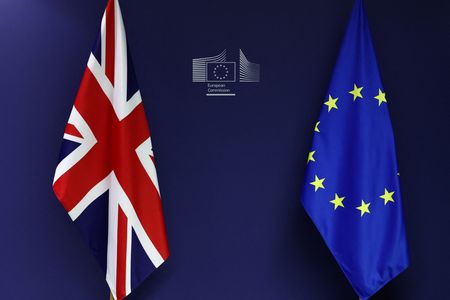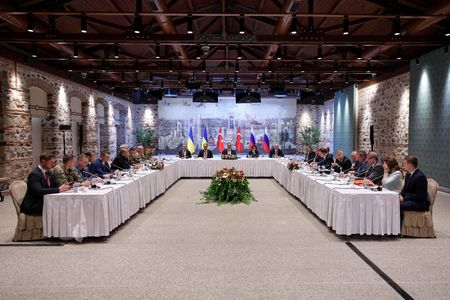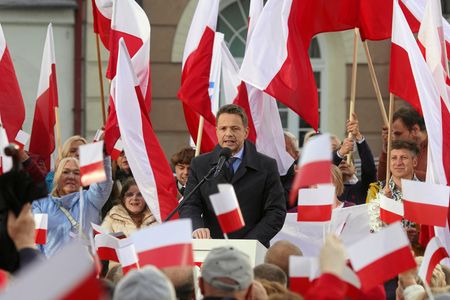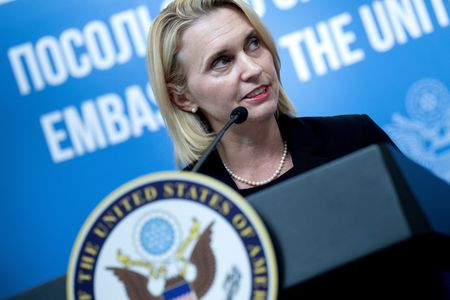LONDON (Reuters) – British Prime Minister Keir Starmer will welcome European Union leaders to London on Monday to help reset relations with the bloc, with both sides aiming to secure progress in some specific areas while other issues will remain off-limits.
Below is a list of issues that could be discussed.
DEFENCE AND SECURITY PACT
Britain’s Labour government wants to pursue a defence and security pact that previous Conservative governments opted not to seek when Brexit was first negotiated.
Both sides agree it is imperative for Europe to work more closely together on its defence, in light of Russia’s invasion of Ukraine and calls by U.S. President Donald Trump for NATO’s European members to shoulder more of the burden of the alliance.
Britain could try to negotiate access for UK companies to joint defence projects under Security Action For Europe (SAFE) – an EU loan scheme worth 150 billion euros ($168 billion) – and how much it will have to pay for that access. This could also facilitate greater foreign policy co-ordination.
But such an agreement may be contingent on other areas such as fish.
SANITARY AND PHYTOSANITARY (SPS)
Labour has positioned a veterinary agreement with the EU as central to its planned EU reset, aimed at preventing unnecessary border checks on agricultural produce such as meat and dairy.
Any deal would maintain high food standards, which Britain also insisted were not lowered in its discussions with the U.S. to remove tariffs.
The EU is likely to ask Britain for dynamic alignment with its SPS rules and a role for the European Court of Justice, which Starmer could agree to, according to think tank UK in a Changing Europe.
The more likely scenario at this summit is that both sides agree on a future framework for negotiations on SPS, rather than reach a final agreement.
YOUTH MOBILITY
Measures to make it easier for under-30s to travel and work between Britain and the EU are seen as a priority for the bloc. But the Starmer government has been cautious, ruling out any return to freedom of movement between Britain and the EU.
A youth mobility scheme would likely involve limits on how many people can use it and how long they can stay, with campaign group Best for Britain finding two-thirds of Britons support a scheme with a two-year limit.
British participation in the Erasmus+ student exchange programme could also be discussed in future.
FISHERIES
Provisions covering both fishing and energy are due to expire in 2026, and need to be extended or renegotiated over the next year.
The post-Brexit trade agreement transferred existing quotas to the bloc for a transition period, after which they would be negotiated on an annual or multi-annual basis.
EU diplomats have said that a fisheries deal should be the same length as any agreement on SPS, to ensure equal leverage during any renegotiations, while France is pushing for any defence deal to be contingent on a fisheries agreement.
Fishing has long been a source of tension in the relationship, with the EU taking Britain to court this year over its ban of fishing for sandeels in UK waters.
ELECTRICITY
Britain left the EU’s internal energy market after Brexit, but the UK’s energy industry is pushing for more efficient and closer electricity trading arrangements with the bloc.
Britain imported around 14% of its electricity in 2024, a record high, through power links with France, Denmark, Norway and Belgium.
CARBON MARKETS
Many EU and British businesses have called for a linking of the two’s carbon markets, and both already collaborate on charging power plants and other industrial entities for their carbon emissions to reach climate targets.
Industry analysts have said linking the two would likely see UK prices, which are lower than the EU, go up to EU levels.
But energy firms say it will save costs for consumers and improve market liquidity, and help Britain avoid penalties under Europe’s Carbon Border Adjustment Mechanism which from 2026 will impose fees on EU imports of steel, cement, aluminium, fertilisers, electricity and hydrogen.
OTHER AREAS
The mutual recognition of certain professional qualifications, changes to ease travel for touring artists, and data-sharing are all areas that Britain and the EU may seek to pursue future agreement on.
($1 = 0.8933 euros)
(Reporting by Alistair Smout, Kate Holton, Philip Blenkinsop, Andrew Gray and Susanna Twidale; Editing by Rachna Uppal)










